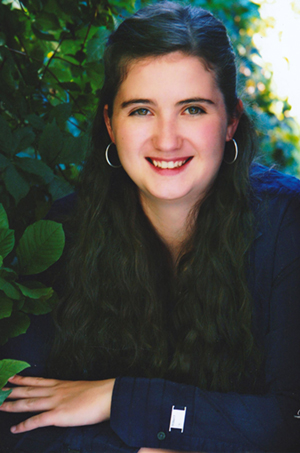 Emily was awarded $3,000 by FFRF for her essay plus a $50 bonus from Dean and Dorea Schramm.
Emily was awarded $3,000 by FFRF for her essay plus a $50 bonus from Dean and Dorea Schramm.
I attend a public school, but religion is everywhere. The Fellowship of Christian Athletes has a dominant presence, a page in the yearbook is devoted to summer youth group trips, teachers run a faculty bible study, and Prayer at the Pole draws large crowds. My school has woven a blanket of Christianity tightly around itself — sparks of skepticism are quickly smothered.
And yet, for some, skepticism persists.
I can’t remember a time when I ever truly believed in God, yet I dutifully attended Mass until middle school. It wasn’t until my sophomore year that I began to embrace what I theretofore had hidden from, embrace the word I didn’t think I could say without receiving dirty looks and hearing snide comments whispered from behind hands in the halls of my school: atheist.
I read Richard Dawkins and Carl Sagan, two incredibly influential authors, for their eloquent defense of science and critique of dogmatic religion. Then I began to think.
Linguist and philosopher Noam Chomsky wrote, on a topic wholly unrelated but nonetheless relevant to a discussion of religion, “Verify what I present . . . see what looks correct, what looks wrong, look at other material which wasn’t discussed, figure out what the truth really is. That’s what you’ve got a brain for.”
I followed Chomsky’s advice, absorbed religious thought and then melded the knowledge into a workable prototype of a moral philosophy. This is a challenging undertaking for any individual, but particularly for a 17-year-old student in a small city surrounded by large, uniformly religious interests.
My speech and debate background gave me a foundation in philosophy that most high school students lack, so my moral standards are a fusion of classical and contemporary philosophy. Once one has rejected the Christian moral system, it is quite liberating to develop one’s own, but the process is fluid, slow-going and ultimately the largest challenge any nonbeliever faces.
It is imperative that one does not simply reject a certain mold of thinking. This step alone, while necessary, is more indicative of, so to speak, “a-thinking,” just as an action that is neither moral nor immoral is amoral, a-thinkers look only to reject what they do not like. They do not value the exploratory process required to find out what they truly do believe.
In my sophomore year, two friends and I made a documentary on the effects of a heavily Christian community on those who choose to leave that religion. Curiously, I spoke little, despite the fact that the project was partially based on my own experiences. But when another student in the video commented that “Emily and I are pretty much the only nonbelievers in the school,” some of my class watching gave an audible gasp.
This was the second challenge that I faced: sharing my religious views in a way that was not pushy yet still raised awareness of the path open to others who may have been feeling similarly smothered. Ultimately, I think I solved this problem by creating the video, then consistently bringing a secular perspective to class discussions and school events.
This year, I co-founded the Fly Free Anti-Slavery Movement at my high school, a branch of a larger organization based out of [the Christian] Whitworth University that works to stop human trafficking. At an early leadership meeting, we were asked why we chose to start our group. Every other student answered in terms of religion — why their Christian faith obligated them to this community service.
My answer was different: “I feel an obligation,” I told them, “but not from religion. I honestly believe our universal humanity dictates our service to each other.” The blank stares I saw were disheartening. It seemed as though, to them, moral obligations did not exist if they were not found in religion.
To me, quite the opposite is true. An obligation based out of religious duty is inherently suspect and less meaningful than one derived from a secular origin. Freethinkers craft their beliefs from everything around them.
I do not seek enlightenment from one narrow corner of a windowpane. Rather, I throw open the shutters and let the light of reason and knowledge flood the room and warm my skin.
Emily Stephens, 17, Colbert, Wash., will attend Georgetown University’s School of Foreign Service to major in international relations. She was an eight-time state debate competitor, competed twice in the National History Bowl and Bee and was her class valedictorian.

